- Home
- Jack Canfield
Chicken Soup for the Soul Page 3
Chicken Soup for the Soul Read online
Page 3
John went on to say, “I can’t get out of bed or even roll over without the help of my attendant. Once I am in my chair, I can do almost everything for myself. My life is more challenging, and I have to be creative in solving life’s problems. But, as long as I remain hopeful, anything is possible.”
John went on to receive a master’s degree in social work. He used his talents by working at the Center for Independent Living, counseling others with significant physical disabilities.
John taught me a lot during the course of our affiliation. The true significance of his gift was not realized until the birth of my youngest son, born thirteen weeks premature. Soon after his birth, Vincent was diagnosed with an eye condition called retinopathy of prematurity. This condition can result in total blindness. Four eye surgeries later, the doctor told us, “We were able to save some of Vincent’s central vision, but he is still legally blind.” This was a devastating blow to our family.
When Vincent was two, we noticed that he didn’t seem to respond when we spoke to him. A trip to the audiologist revealed that he had severe hearing loss in both ears. Vincent also has a chronic lung disease, a reflux disorder, and several other physical conditions that greatly delayed his development. With the discovery of each disability, I grieved as any parent would. Then I thought about John and what he taught me about the difference between being disabled and handicapped. I vowed not to become a handicap to my son.
Vincent has limitations, but compensates well. He can run, ride a bicycle, and swim like a fish. He is a high-spirited child with a wonderful sense of humor. His love of life gives him the determination to laugh at himself and keep on trying. The hope John instilled in me the day he shared his own experience has been a source of strength for me each time Vincent faces new challenges. This hope keeps me focused on Vincent’s “other abilities” rather than his disabilities. I am constantly amazed by his tenacity and determination, but, then, I had John for a teacher, and he taught me well.
Jo Clancy
Jo Clancy, LCSW, received a bachelor’s degree in psychology in 1985. She completed a master’s degree in social work in 1987. Jo is employed full-time in the Trauma Recovery Program at the Houston Veterans Affairs Medical Center. Her specialty areas include anger management, relapse prevention, and psychiatric trauma. She dedicates her story to the memory of John Parker, her teacher and friend.
The Miracle of Jay-Jay
Age does not protect you from love. But love, to some extent, protects you from age.
Jeanne Moreau
“He doesn’t look like the other boys,” Grandpa said as he viewed the blanketed bundle I held in my arms. He was right. James Ryan, whom we called Jay-Jay, with his skinny little legs, almost bald head, and tiny, slanted eyes, bore little resemblance to my other chubby babies with their full heads of hair. But I knew the comment went far beyond looks. Grandpa couldn’t accept the fact that Jay-Jay had Down syndrome and mental retardation.
On subsequent visits, Pa-Pa, the name the other children used for their grandpa, ignored Jay-Jay. He picked him up once at a family reunion when it seemed to be expected for a family picture. Other than that, he never touched him, and looked upon him with something between pity and displeasure.
Then, one day, a miracle began. We were once again at a family reunion, and Jay-Jay, being the outgoing little boy he was at three years old, walked over to his grandpa and crawled onto his lap. Pa-Pa was a little shocked, but what could he do in front of all these people? This was his grandson. How could they understand that he hardly knew Jay-Jay?
Jay-Jay took his grandpa’s glasses out of his shirt pocket and placed them on his own face, upside down, precariously perched on his short, pudgy nose. He looked at Pa-Pa and giggled, making Pa-Pa laugh, too. Soon they were walking around the room, Jay-Jay leading Pa-Pa, a little smile on the older one’s face.
Their next encounter came months later when Pa-Pa decided to visit. Jay-Jay played the clown, making his grandpa laugh and pick him up and throw him into the air.
Pa-Pa turned to my husband and said, “Why, he’s just like any other kid.”
We had tried to tell him, but Pa-Pa’s preconceived ideas and fears of the disabled had kept him out of his grandson’s life. But Jay-Jay, being an effervescent little boy, would not let him remain in darkness. With his love and actions, he showed Pa-Pa and others that they were missing out on some of God’s greatest blessings by not loving and caring for him.
After that day, a strong bond began to form. Pa-Pa found that Jay-Jay loved balloons and would have one waiting for him each time we came to visit—visits he now welcomed. Then he discovered that Jay-Jay was not only sweet, but ornery, and he loved pillow fights. So each visit would end up with pillows flying across the room. I never figured out which of the two enjoyed it most. Soon Pa-Pa began to telephone—supposedly to talk to my husband, who was now glowing in the new relationship between his father and son—but always insisting on speaking to his youngest grandson.
Although Jay-Jay has a severe speech articulation disorder, he can understand most of what is said to him. Yet he finds it difficult to form the words he wants to say, making communication difficult. Nevertheless, Pa-Pa always wanted to speak to him by phone, and Jay-Jay would laugh and talk in words that neither his dad nor I understood. Pa-Pa swore he understood every word.
The phone chats became a weekly ritual. Every Saturday morning, Jay-Jay knew it was the day to talk to Pa-Pa. Since it was long distance, they took turns calling. One week, Pa-Pa would call. The next week, all excited, Jay-Jay would make the call and talk until we made him hang up.
Through the years, Jay, as he is called today, and Pa-Pa continued those weekly phone calls, along with letters, cards, fishing trips, and frequent trips to Wal-Mart. They became “best buddies.”
When Jay was nineteen, his beloved Pa-Pa died unexpectedly. One of the hardest days of my life was watching Jay stand at his Pa-Pa’s graveside as he was presented the American flag that draped the casket. But one of the things I cherish most is knowing that Jay’s unconditional love built a bridge to his grandfather’s heart and changed both of their worlds forever.
Louise Tucker Jones
Louise Tucker Jones is a vibrant speaker and award-winning author of Extraordinary Kids (coauthor, Cheri Fuller). Her son Jay has participated in Special Olympics Art for most of his thirty-one years and has won numerous ribbons and trophies for his photography. Louise resides in Edmond, Oklahoma, with her husband, Carl, and son Jay, the youngest of their four children. Contact Louise at [email protected] or www.LouiseTuckerJones.com.
“My grandkids keep me young alright. I don’t know
whether to throw a tantrum or take a nap.”
Reprinted by permission of Jean Sorensen and Cartoon Resources. ©2005 Cartoon Resources.
Out of the Mouths of Babes
Our boys, Devon and Kaleb, had been with their Nana and Grandpa all day long while I was at work. When I arrived to pick them up, Devon immediately started to recant the list of the day’s events in his usual manner, basically telling me everything for which he had gotten into trouble all day long. When Grandpa got down on his knees to give Devon his good-bye kiss, Devon stopped him with a little outstretched hand and simply stated, “What happened to Grandpa’s hair?”
I quickly muttered, “He lost it.”
Devon started looking around to find it, when he found his answer. “Mommy, it’s okay. Look! It’s all on his back!”
Sarah and MMC John S. Smigal
John and Sarah Smigal, along with Devon and Kaleb, are stationed in Groton, Connecticut, where John is a chief aboard the USS Hawaii. Devon was diagnosed with autism in 2006. Devon has conquered a great many things since his premature birth, and he is destined for greatness.
Tomorrow
To love is to receive a glimpse of heaven.
Karen Sunde
“What doing tomorrow?” asked my son, Jeff, whose speech lacked some of the necessities required to form grammat
ically correct sentences.
Lately, these were the first words from his mouth almost every morning. Jeff had already known what we would be doing that day because he had asked yesterday. I soon realized that he understood much more than I had imagined.
Jeff was born with Down syndrome. At age eleven, he was diagnosed with acute lymphatic leukemia (ALL). This disease required a specific regime of treatment every day. Sometimes it required a hospital admission for chemotherapy. On other days, it required an outpatient visit to the hospital for IVs, spinal taps, or blood tests, and other days would involve frequent administrations of medications that tasted like aluminum foil. Sometimes, unexpected complications required further tests, procedures, or medications. I did not think that Jeff would understand the reasoning for so many things that only made him feel worse, but he did. Asking about tomorrow was his way of preparing for what lay ahead, and I always felt that I owed him complete honesty. We both clung to the hope of tomorrow—not like the tomorrows of the past or the present, but the hope of a new tomorrow that would allow for living without sickness or pain.
Jeff had changed, not only physically, but in his whole personality. The light that had always twinkled in his eyes was gone. Our interactions seemed always to reflect our caregiver and patient relationship. This disease saturated his spirit. He knew what I would not allow in my deepest thoughts.
We were once in a waiting room waiting to be called in for a blood test. The nurse came out and called Jeff’s name.
He responded, “No, no Jeff, I Jack.”
It was heart-wrenching to see my little boy trying to assume a new identity. How I longed to press rewind to take us back to our lives behind the white picket fence— back to the days of laughter when Jeff would get off the school bus and come running up our driveway.
“Wilma, I’m home,” he would shout as he walked into our front door, borrowing the line from Fred Flintstone.
Jeff also liked to pretend that he was the scarecrow from The Wizard of Oz.
“‘Over the Rainbow,’ Mom, sing it,” he often requested.
He watched the video so many times I think I knew the entire script by heart. Through Jeff, I was able to see the Land of Oz. He opened my eyes to the vibrant colors of a majestic land where trees could talk, scarecrows could walk, and horses were of many colors. Everyone was different, yet no one noticed. My heart would tingle with what I can only describe as a surge of joy each time I saw Jeff perform this song.
But my favorite performance was “Tomorrow” from the musical Annie. With his arms stretched out wide, and a simultaneous jerk of his head and hands, Jeff would sing out loudly, “Tomorrow, tomorrow, the sun tomorrow.” He was quite a performer and always willing to entertain.
When Jeff was first diagnosed with leukemia, I had no idea how to explain to him that he would not get well for a long time. What the doctors called “Phase One” of treatment, an intensive phase to say the least, was to last six months, before progressing to the next less-intensive phase. How could I explain that to my little boy? It soon occurred to me, once again, that I did not have to. Jeff would be my teacher. My challenged little boy was also my most influential mentor.
Jeff had been feeling sick since the beginning of his treatments. As the days wore on, I tried desperately to raise his spirits and give him hope. At this point, I had to carry him into the bathroom because he was too weak to walk.
“I very sick, Mom,” Jeff said, while standing in the shower with my support.
I replied, “Tomorrow, we will see the doctor, and he will make you feel better.”
With his head hung down, Jeff replied, “No, I die.”
In desperation, I grabbed his chin and raised his head to meet my eyes. My body trembled. I struggled to speak with confidence. I needed to reassure not only Jeff, but myself as well. “You are not going to die! Do you hear me? Do you understand? You are not going to die!” Jeff did not reply.
He knew and accepted what I could not.
After ten weeks of chemotherapy, my son developed an infection. He was hospitalized for six days before the infection became worse, and he had to be moved to the intensive-care unit. Despite his pain and suffering, Jeff began to teach me new lessons. He had taught me countless lessons about living, and now he was teaching me about dying.
The doctors were getting ready to intubate Jeff to help him breathe. I think on some level we both knew that once they placed that tube in his throat, the end was near. With all of the strength he could muster, Jeff looked at me and said, “Tomorrow, tomorrow, you and me go shopping. Okay? You and me. Okay?” This was his way of telling me that he could no longer deal with “his today,” and that he was going to “his tomorrow.” He wanted the pain to end. I contracted every muscle in my body and demanded myself to stop the trembling. I prayed for one last moment of peace so that I could answer my son with the respect that he so deserved.
“Yes, Jeff,” I said. “Tomorrow, just you and me, tomorrow.”
The doctors paralyzed him and placed the tube in his throat. I watched the numbers on the machine gradually decrease as it measured his heartbeats. With one finger, I gently swept Jeff’s hair back across his forehead as I sang softly. This was the usual routine, one that he was so fond of, that I had used to get him to go to sleep when he was younger. Knowing that these would be my final moments with my son, I told him that if he needed to go, it would be all right. And with my cheek against his, I whispered in his ear, “I’ll meet you just over the rainbow, tomorrow.”
Jill Presson
Jill Presson has worked in occupational therapy for over ten years. She is the proud parent of four children, two biological and two through the gift of adoption. Three of Jill’s children have Down syndrome. She is an active advocate for Down syndrome, special-needs adoption, and grieving parents. Jill can be reached at [email protected].
No Words
T.J. struggles with the pencil in his left hand, pushing it carefully up and down on the notepad that sits in his lap. My middle sister, Kellie, has asked him to write the word “Mommy” on the paper to show my younger sister and me what he has recently learned in school. The pencil stops moving. T.J. yells “Mommy!” and turns the notepad around to show us the scribbled letters M-O-M on the paper. We all clap and cheer at his accomplishment, and we watch as a proud smile spreads across his face. This may seem like an insignificant feat, but for T.J., it is a milestone. He has just learned how to spell “Mom,” and he is ten years old.
My little brother, T.J., was born on my first day of high school. My parents were in their early forties at the time, and it was a surprising situation for all of us to have a new baby in the house. My dad, Tom, was the most excited of all, since he finally had a boy to balance out his houseful of women.
When he was three, my family discovered that T.J. was not developing language skills at a normal rate. The doctors did not have any answers as to what could be causing the delay.
T.J.’s disorder put a strain on my family, and our household could be a tense place to live during some of the years that followed. As my brother got older, it became more apparent that his disabilities reached beyond simple language skills.
My mom spent a lot of her time trying to find a solution. My dad reacted in a very different way. He embraced his chance to be a father to his son. They would go for haircuts, hang out at the mall, or just drive around listening to sports radio in the car. T.J. loves these outings with our dad, and the minute he returns from work, my brother pulls on his shoes and waits by the door. He and my dad have developed a bond that goes beyond my brother’s “problem,” and have become buddies who struggle every day to maintain a semblance of normalcy.
There was one day in particular when I realized that my father had fully accepted T.J. for who he is, and it was this same moment in which I saw the true depth of my father’s love for my brother. We were sitting on a bench by the lake—the three of us—and my dad was making funny faces to make my brother laugh. In the mids
t of the laughter, T.J. stopped and reached up to softly touch our father’s face. My dad looked down at him and said almost so softly that I couldn’t hear, “Well, kiddo, it looks like it’s you and me for the rest of my life.” There wasn’t a sense of sadness or burden in my father’s voice, only acceptance and unconditional love for the little boy who sat beside him. It seemed that T. J. understood this, too, in his own way, and he smiled and touched our father’s face again.
T.J.’s condition has yet to be fully diagnosed. My parents continue to help T.J. express himself with words, pictures, and sounds. My dad and T.J., however, have become a duo, and when it’s time for them to go “cruising” in Dad’s car, we all know that it is strictly boys’ night out. The women in our house know that T.J. loves all of us, each in a different way, but the love he has for his dad is written in a language only he understands. All of us have the privilege of speech, but only the two of them speak their language, and it requires no words.
Stacey Flood
Stacey Flood received her B.A. in English from DePaul University in 2003. She lives in Chicago with her boyfriend and their three dogs. She is currently attending culinary school, and she loves to cook for her friends and family. T.J. continues to learn new things every day with the help of his extraordinary speech therapists, and he and his dad are still “partners in crime.” The two of them have developed a new passion—anytime you ask T.J. where he wants to go, all he will say is “Monster trucks.” Contact Stacey at [email protected].

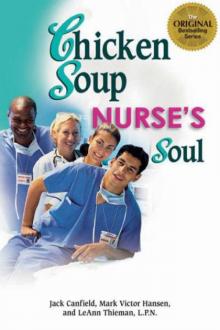 Chicken Soup for the Nurse's Soul: Second Dose
Chicken Soup for the Nurse's Soul: Second Dose Chicken Soup for the Ocean Lover's Soul
Chicken Soup for the Ocean Lover's Soul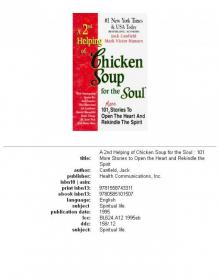 A 2nd Helping of Chicken Soup for the Soul
A 2nd Helping of Chicken Soup for the Soul Chicken Soup for the Nurse's Soul
Chicken Soup for the Nurse's Soul Chicken Soup for the Breast Cancer Survivor's Soul
Chicken Soup for the Breast Cancer Survivor's Soul Chicken Soup for the Pet Lover's Soul
Chicken Soup for the Pet Lover's Soul Chicken Soup for the Bride's Soul
Chicken Soup for the Bride's Soul A Chicken Soup for the Soul Christmas
A Chicken Soup for the Soul Christmas Chicken Soup for the Soul of America
Chicken Soup for the Soul of America Chicken Soup for the Teenage Soul on Tough Stuff
Chicken Soup for the Teenage Soul on Tough Stuff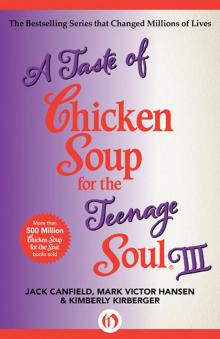 A Taste of Chicken Soup for the Teenage Soul III
A Taste of Chicken Soup for the Teenage Soul III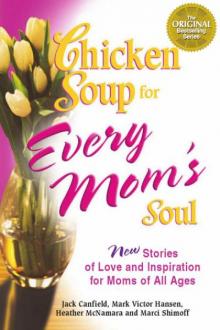 Chicken Soup for Every Mom's Soul
Chicken Soup for Every Mom's Soul Chicken Soup for the Dog Lover's Soul
Chicken Soup for the Dog Lover's Soul A Second Chicken Soup for the Woman's Soul
A Second Chicken Soup for the Woman's Soul Chicken Soup for the Soul the Book of Christmas Virtues
Chicken Soup for the Soul the Book of Christmas Virtues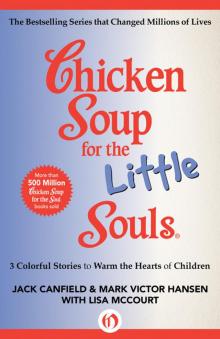 Chicken Soup for the Little Souls: 3 Colorful Stories to Warm the Hearts of Children
Chicken Soup for the Little Souls: 3 Colorful Stories to Warm the Hearts of Children Chicken Soup for the African American Woman's Soul
Chicken Soup for the African American Woman's Soul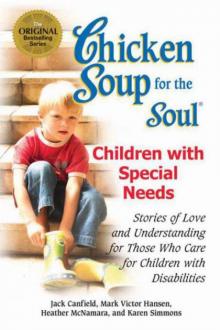 Chicken Soup for the Soul
Chicken Soup for the Soul Chicken Soup for the Soul Celebrates Teachers
Chicken Soup for the Soul Celebrates Teachers Chicken Soup for the College Soul
Chicken Soup for the College Soul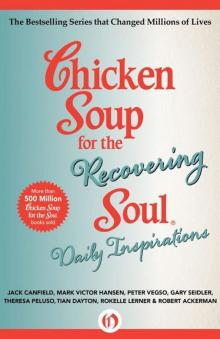 Chicken Soup for the Recovering Soul Daily Inspirations
Chicken Soup for the Recovering Soul Daily Inspirations Chicken Soup for the Soul Celebrates Sisters
Chicken Soup for the Soul Celebrates Sisters Chicken Soup for the Dieter's Soul
Chicken Soup for the Dieter's Soul Chicken Soup for the Soul at Work 101 Stories of Courage
Chicken Soup for the Soul at Work 101 Stories of Courage Chicken Soup for the Beach Lover's Soul
Chicken Soup for the Beach Lover's Soul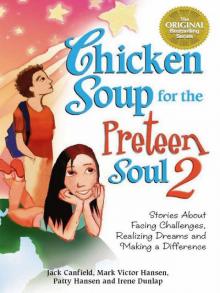 Stories About Facing Challenges, Realizing Dreams and Making a Difference
Stories About Facing Challenges, Realizing Dreams and Making a Difference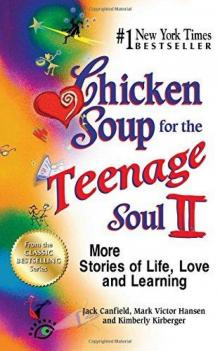 Chicken Soup for the Teenage Soul II
Chicken Soup for the Teenage Soul II Chicken Soup for the Girl's Soul
Chicken Soup for the Girl's Soul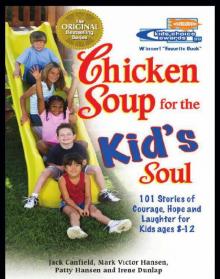 Chicken Soup for the Kid's Soul: 101 Stories of Courage, Hope and Laughter
Chicken Soup for the Kid's Soul: 101 Stories of Courage, Hope and Laughter Chicken Soup for the Woman's Soul
Chicken Soup for the Woman's Soul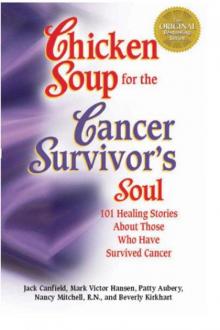 Chicken Soup for the Cancer Survivor's Soul
Chicken Soup for the Cancer Survivor's Soul Chicken Soup for the Canadian Soul
Chicken Soup for the Canadian Soul Chicken Soup for the Military Wife's Soul
Chicken Soup for the Military Wife's Soul A 4th Course of Chicken Soup for the Soul
A 4th Course of Chicken Soup for the Soul Chicken Soup Unsinkable Soul
Chicken Soup Unsinkable Soul Chicken Soup for the Soul: Christmas Magic
Chicken Soup for the Soul: Christmas Magic Chicken Soup for the Grandma's Soul
Chicken Soup for the Grandma's Soul Chicken Soup for the Soul: All Your Favorite Original Stories
Chicken Soup for the Soul: All Your Favorite Original Stories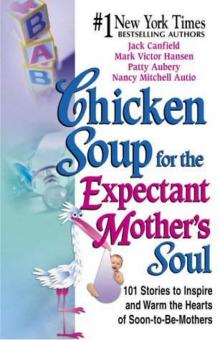 Chicken Soup for the Expectant Mother's Soul
Chicken Soup for the Expectant Mother's Soul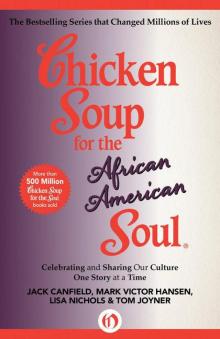 Chicken Soup for the African American Soul
Chicken Soup for the African American Soul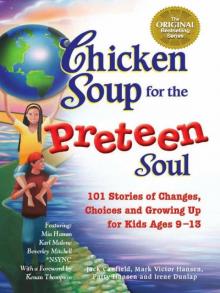 101 Stories of Changes, Choices and Growing Up for Kids Ages 9-13
101 Stories of Changes, Choices and Growing Up for Kids Ages 9-13 Christmas Magic
Christmas Magic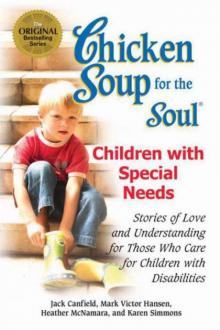 Chicken Soup for the Soul: Children with Special Needs
Chicken Soup for the Soul: Children with Special Needs Chicken Soup for the Soul: Country Music: The Inspirational Stories behind 101 of Your Favorite Country Songs
Chicken Soup for the Soul: Country Music: The Inspirational Stories behind 101 of Your Favorite Country Songs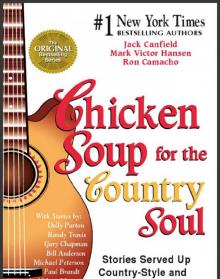 Chicken Soup for the Country Soul
Chicken Soup for the Country Soul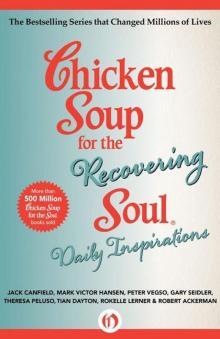 Chicken Soup for the Recovering Soul Daily Inspirations (Chicken Soup for the Soul)
Chicken Soup for the Recovering Soul Daily Inspirations (Chicken Soup for the Soul)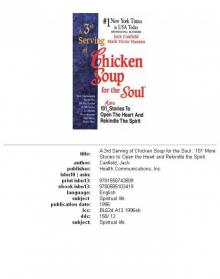 A 3rd Serving of Chicken Soup for the Soul
A 3rd Serving of Chicken Soup for the Soul The Book of Christmas Virtues
The Book of Christmas Virtues Chicken Soup for the Soul at Work
Chicken Soup for the Soul at Work Chicken Soup for the Soul 20th Anniversary Edition
Chicken Soup for the Soul 20th Anniversary Edition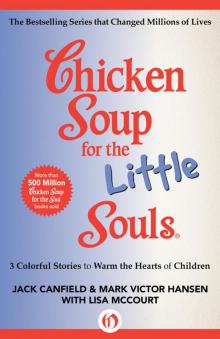 Chicken Soup for the Little Souls
Chicken Soup for the Little Souls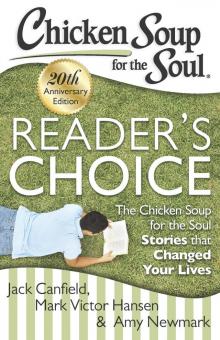 Chicken Soup for the Soul: Reader's Choice 20th Anniversary Edition
Chicken Soup for the Soul: Reader's Choice 20th Anniversary Edition Chicken Soup for the Soul Christmas
Chicken Soup for the Soul Christmas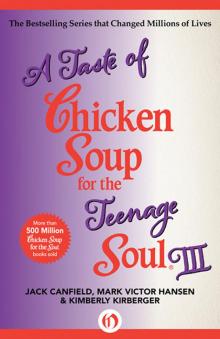 Taste of Chicken Soup for the Teenage Soul III
Taste of Chicken Soup for the Teenage Soul III Chicken Soup for the Unsinkable Soul
Chicken Soup for the Unsinkable Soul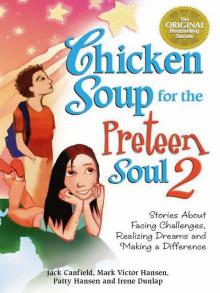 Chicken Soup for the Preteen Soul II
Chicken Soup for the Preteen Soul II